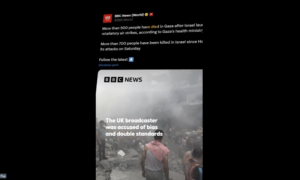Media reports of the Hamas attack on Israel and the bombing of Gaza lead once again to questions about the language used by public speakers. Both the writers and the recipients should be alert to the common pitfalls
Israeli-Palestinian conflict?
Most media reports describe the relationship between Israel and Palestine as a conflict. However, as the non-profit organisation The Slow Factory, among others, points out, “a conflict means there is equal footing.” So far, we were able to speak of “an active oppressor (Israel) and an oppressed (Palestine). A colonizer (Israel) and a colonized (Palestine)”. By using this term, we are therefore diluting Israel’s responsibility for the longstanding occupation of Palestine.
Journalist Asia Khatun also wrote about terms such as “conflict” and “clashes” in an article for Tribune – “These language choices, be they irresponsible or just ignorant, reinforce the notion that this is a conflict in which both sides have the means to be equally as violent towards the other.” The reality is, however, as Khatun says, that Israel is one of the most militarised occupying countries in the world. Financially supported by the US. She acknowledges that “the power dynamic that Western society at large believes to be in existence simply does not exist.”
Would it be better then, in the face of the current operations, to speak of a war, declared officially by Israel on October 8? The term “Palestinian-Israeli war” may also suggest a symmetry of forces where there is none. There are those who believe that the best fitting description of current events is “crimes against humanity” committed by Israel against Palestinians. This is the term used by UN experts, among others, in a statement published on October 19, pointing to the risk of genocide of the Palestinian people.
When it comes to Palestinian-Israeli relations before the Hamas attack, the Slow Factory has called for the use of precise terms such as “settler colonisation,” “military occupation,” “land grabbing” or “ethnic cleansing,” as recently as last year.
Are Hamas terrorists?
There are plenty of definitions of terrorism. The interpretation adopted at the NATO summit in Prague in November 2002, defines it as “the unlawful use or threatened use of force or violence against individuals or property in an attempt to coerce or intimidate governments or societies to achieve political, religious or ideological objectives.”
It would seem, therefore, that calling Hamas a terrorist organisation or talking about a terrorist attack on Israel should not be controversial. However, if the term appears in the media only in relation to Hamas without being used to stigmatise Israel’s actions, it ceases to be objective.
Critics note that the crimes currently being committed by Israel against Palestinian civilians, but also their violent displacement, should be described as acts of state terror. Moreover, many of them correspond to the definition of war crimes adopted by the UN.
Support peace journalism, support Salam Lab >>>
It is very common to read about “Palestinian terrorists” and “Israeli forces” or “Hamas militants” and the “Israeli army” in the Polish media. It is a manipulation of the narrative that involves automatically attributing righteousness to one side’s actions.
Anthropologist Emilie El Khoury, who studies how labelling and categorisation can create social divisions, points out that calling one side “terrorists” makes it difficult to condemn the violence perpetrated by the other side. The bombing of homes, hospitals and schools in Gaza can then be justified by the law of retaliation and anti-terrorism measures. In an article for The Conversation he writes, “labeling a single actor a terrorist immediately makes supporting their cause more challenging. It also undermines the defence of the broader population affected by violence. And, ultimately, it is the general population that suffers the consequences of political maneuvers.”
According to El Khoury, the consequence of such labelling could spread the belief that the entire population of Gaza is responsible for Hamas’ actions and supports terrorism. As an example, she cites BBC, which, in its coverage of pro-Palestinian protests, portrayed the protesters as Hamas-supporters. Following criticism, the station made a public apology, admitting that the wording it used was unfortunate and misleading.
The BBC editorial board also issued a statement justifying why it did not call Hamas’ members terrorists. In its view, this would suggest an unambiguous moral stance and would imply a break with the obligation to remain objective. Although the term is not used by the authors and contributors to the publication explicitly, in most cases the editors add that Hamas is viewed by the Western governments as a terrorist organization. Some critics believe this does not really eliminate the bias problem.
“No media organisation would ever refer to the Israeli government in equivalent terms: noting with every mention that Israel is designated by human rights organisations as an apartheid state and a serial violator of international law,” Jonathan Cook writes in an editorial for Middle East Eye.
Dead or killed?
Western media has also faced criticism from British journalist Harry Fear, who accused them of being biased in their coverage of events in Israel and Palestine. He pointed, that the dominant narrative is based on the Israeli perspective and the media focuses on unverified information, reproducing fake news while neglecting to report on the suffering of Palestinian civilians. This was the case, among others, with reports of decapitations of children by Hamas members, which turned out to be unconfirmed information based on the account of one Israeli soldier.
The choice of words in the news provided is extremely important. Sometimes even nuances can significantly affect how a given situation will be perceived by the audience. As an example, Fear highlighted the BBC’ tendency to refer to the number of casualties among Palestinians by the use of a word “dead,” while the Israelis are considered to have been “killed” in the reports.
As Laura Albasti Cat Knarr wrote in The Washington Post in 2022, “this is a pattern we have seen over and over again in media coverage of Palestine. Palestinians are not killed; we simply die. When Israeli forces raid our neighborhoods in the middle of the night, bomb our children, demolish our homes, colonize our land and kill our people, we are somehow equal instigators.”
“An unprovoked attack on Israel?”
There are many inaccuracies in the media and the language used often becomes a tool of manipulation. Politicians who speak of an “unprovoked attack on Israel” erase years of history preceding the events of October 7. Some try to put an equal sign between the actions of Hamas and ISIS, which is a simple way to justify Israeli violence in Gaza and gross violations of the international law. Israeli Defence Minister Yoav Gallant, on the other hand, speaks openly about the total siege of Gaza dehumanising Palestinians by calling the state’s actions a fight against “human animals.”
The manipulative narrative tricks were brilliantly exposed by Palestinian writer and journalist Mohammed El-Kurd in his recording. “Who controls the NHS? The UK. Who controls the French Department of Health? The French government […] So, let’s ask ourselves a question. Why is it that when the mainstream news networks are referring to hospitals or schools in the Gaza Strip, they will often say “Hamas-run?” Regardless of what you may think of it, Hamas is the governing body in the Gaza Strip. And so logically, the Ministry of Health would be under its jurisdiction”.
El-Kurd thus demonstrates that adding information about whose control Palestinian health care is under, does not serve to expand the knowledge of the viewer or recipient. Rather, it is a suggestion that all institutions in Palestine are somehow linked to an organisation that Western states consider to be terrorist. In this way, the media influences our emotions and prejudices, making us lose sight of Palestinian patients and empathise less with the victims of the raids.
Good practices
The escalation of violence in Israel and Palestine is ongoing and part and parcel of it is the information and propaganda war. It is useful to be aware of this when reading new press reports and to be critical of the content we consume. Journalists, on the other hand, can use the guidelines that the Association of Arab and Middle Eastern Journalists has prepared to cover Israel and Palestine issues with integrity.
The key recommendations read:
- “Remember the broader context of Palestinian-Israeli relations [e.g. the Nakba and the earlier Gaza bombings – editor’s note] and how they tie into the events you’re currently covering.
- Be aware, also, of the current context. For example, […] the months leading up to the October 2023.
- Avoid ‘both sides’ framing. Recognize the power imbalance between Israel and the Palestinian people.
- Double check ‘official’ sources, whether from governments or the military.”



